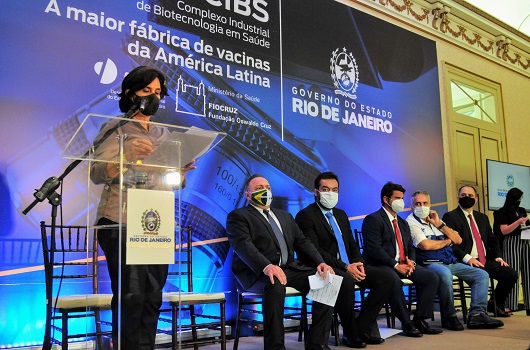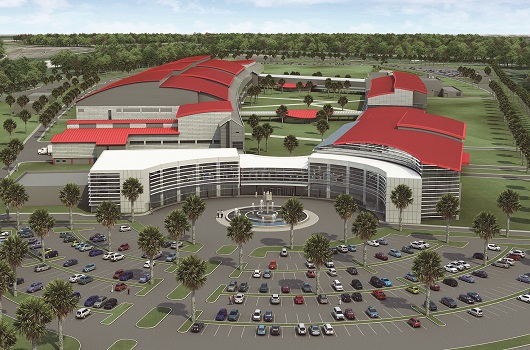Government of Rio and Fiocruz sign deed for largest vaccine factory in LA
16/12/2020
Rodrigo Pereira (Bio-Manguinhos/Fiocruz)
The Oswaldo Cruz Foundation, through the Institute of Technology in Immunobiologicals (Bio-Manguinhos), signed with the Government of the State of Rio de Janeiro, this Thursday (3/12), the final deed of the land where the Industrial Complex of Biotechnology in Health (Cibs) is being built, in the Industrial District of Santa Cruz, in Rio de Janeiro. The ceremony took place at the Guanabara Palace, the head office of the Rio de Janeiro government, attended by the Minister of Health, Eduardo Pazuello, the president of Fiocruz, Nísia Trindade Lima, the Congressman Luiz Antonio Teixeira Jr. (PP-RJ), the acting governor of the State of Rio de Janeiro, Cláudio Castro, the State Secretary for Health, Carlos Alberto de Carvalho, and the President of the Industrial Development Company of the State of Rio de Janeiro (Codin), Fábio Galvão.

The president of Fiocruz, Nísia Trindade Lima, stated that the project has strategic value for Brazil and its health system (Photo: Pedro Paulo Gonçalves)
“We are seeing the largest center for the production of biological products in Latin America being born. We have to get it to work. It will be a strategic center to reinforce the National Immunization Program (PNI), in addition to being a landmark for public health and for Brazil. In the future, we will be fit to face other situations like the one we are living in. It is a cutting-edge project of which we are very proud”, said the Minister of Health Eduardo Pazuello.
The project will be the largest center for the production of biological products in Latin America and one of the most modern in the world. Thus, Fiocruz will be able to increase up to four times the production capacity of vaccines and biopharmaceuticals to meet primarily the demands of the Brazilian Public Health System (known by the acronym SUS), through the PNI and the Specialized Component of Pharmaceutical Assistance (Ceaf), respectively. The investment is of approximately BRL 3.4 billion (660 million dollars) and provides for the generation of 5,000 direct jobs during construction, and 1,500 jobs for its operation.
For the president of Fiocruz, Nísia Trindade Lima, the project has a strategic value for Brazil and for the Brazilian health system, with the expansion of the vaccine offers, and special importance for the economic development of the State of Rio de Janeiro. “Today, we are taking a very important step. The issuance of the final deed of the land in Santa Cruz, for Fiocruz, will allow us to publish the invitation to bid on the largest investment in public health in the country. This undertaking will guarantee the continuity of national vaccination strategies, offering modern vaccines to the population. It will be the largest immunological production center in Latin America, with the capacity to quadruple our current production”, guarantees the president.
The final deed of the land guarantees security for raising private capital, in the BTS (built to suit) financing model, a modality that will be used to finalize the construction of the project. Under this model, the financing will be private, paid in the form of the lease with reversion over the 15-year term. The land has already received investments from the Ministry of Health for the earthmoving stages, piling of all buildings, construction of blocks and straps, environmental offset, as well as for the acquisition of the main production equipment. With the signature, the 580 thousand m2 land, which belonged to Codin, becomes Fiocruz's definitively. In addition to the president, the event was also attended by the vice president of Institutional Management and Development of Fiocruz, Mário Moreira, the director of Bio-Manguinhos/Fiocruz, Mauricio Zuma, and the chief of staff, Valcler Rangel.
The project
The land of the Industrial Complex of Biotechnology in Health (Cibs) covers an area of approximately 580 thousand m². Only the new Final Processing Center (NCPFI), the main installation of the project, represents 334 thousand m² of built area. The complex will initially consist of nine buildings, including two for the formulation, filling, freeze-drying and review; and the others for packaging activities; storage of raw material; finished product storage; quality control and guarantee; utilities in general; and waste and effluent treatment plants; and administration. The land also has areas reserved for future expansions.

Illustrative image of the project
The director of Bio-Manguinhos, Mauricio Zuma, says that this project was motivated by the need to fully meet national and international regulatory requirements, to expand and offer products demanded by the Ministry of Health, to develop new presentations of vaccines and biopharmaceuticals, in addition to the possibility of offering products to other countries. “The challenge now is to make the new center a reality. We are aware of the enormous challenges, but we need to take this leap to maintain our strategic role in public health”.
The production capacity is estimated at 120 million vials of vaccines and biopharmaceuticals/year and may be expanded depending on the operating regime to be adopted. In doses, the capacity will vary according to the product mix. Currently, Bio-Manguinhos supplies vaccines with presentations of 1 dose, 5 doses, and 10 doses/bottle, and the expansion of the production capacity at the new factory also represents the possibility of incorporating new presentations.
The areas of final processing will incorporate cutting-edge technologies through the philosophy of Advanced Aseptic Processing (AAP), in line with new technological trends. These cutting-edge technologies make it easier to obtain certifications from regulatory agencies and international bodies – ensuring to the Institute the status of a global supplier of immunobiological. The high level of applied automation will allow greater operational safety at a lower cost and also greater precision and guarantee in the quality of the final processing steps.
It is also a sustainable project, which will have panels for capturing solar energy; reservoirs to collect rainwater; a water reuse system; the acquisition of material with recycled content. In the initial stage, 30 thousand trees have already been planted to form a greening belt of Atlantic Forest to preserve local biodiversity; among other initiatives.
The advantages of the new project go beyond ensuring the supply of more products to the Ministry of Health. The center, which will meet regulatory requirements by the Brazilian National of Health Surveillance (Anvisa) and international agencies such as the World Health Organization (WHO), Food and Drug Administration (FDA), and European Medicines Agency (EMEA), has the potential to use flexible and adaptable platforms, allowing it to expand existing product lines and include new ones; export; establish new partnerships and increase Brazil's competitiveness in the immunobiological sector. Thus, it will also contribute significantly to the strengthening of the Economic and Industrial Health Complex in the country, strengthening the production chain, generating jobs, and bringing savings to the public coffers.
The new plant may, for example, enable the production of new vaccines, such as the bivalent vaccine (measles and rubella), clinical studies of which were recently concluded by Bio-Manguinhos, and meningococcal C, which is in an advanced stage of studies phases II/III, in addition to new vaccine presentations from the Institute's portfolio (number of doses/bottle), to meet different needs of the health system. So, the Institute reaffirms its important role in combating diseases preventable by vaccination, as well as in the treatment of chronic diseases such as rheumatoid arthritis, multiple sclerosis, and oncological diseases, including allowing the expansion of federal government programs through the incorporation of new immunobiological for the population.
Investment in infrastructure and technological skills in the production of immunobiological is a strategic issue of the State, not only to ensure national self-sufficiency and sovereignty in meeting routine demands of interest to public health but also to enable rapid response to emergency demands. Currently, this training is essential for the establishment of the final processing stages and the incorporation of the COVID-19 vaccine technology, which will take place in the current Bio-Manguinhos facilities. In the future, if necessary, it will be possible to expand the productive capacity of this vaccine in Santa Cruz.


